
Since artificial intelligence (AI) technologies like ChatGPT and others have broken into our lives, business owners have thoroughly investigated its capabilities for innovating ecommerce solutions. Their endeavors were not in vain, for AI became one of the most essential tools for personalizing user experience. In this article, you will learn how to use AI solutions for ecommerce personalization and which AI tools you can leverage to boost your sales.
The role of AI in ecommerce personalization
Over 70% of US companies have adopted AI in some areas of their business. The increase in AI adoption is caused primarily by its cost-effectiveness and compatibility with ecommerce processes and goals. According to McKinsey’s Global Survey on AI, 79% of respondents claim that implementing AI in marketing and sales increased business revenue. The list of the fields of AI implementation in ecommerce continues to grow, making it one of the most desirable investments for business owners.
Here are some some ecommerce areas where AI can be applied:
Targeted advertising
Contextual search
Voice and visual search
Computer vision
Demand forecasting
Fraud detection
Sales forecasting
Inventory management
Content creation
Personalization
The role of AI ecommerce personalization is huge since AI models can analyze customer browsing history, purchases, and behavioral patterns, leading to a better understanding of customer desires and intentions, the foundation of effective AI for ecommerce services. This, in turn, allows website content, search, and support to adjust to customers' needs, increasing conversions, sales, and customer loyalty.
Check out some other benefits of using AI personalization in ecommerce.
- Optimized expenses: By leveraging AI chatbots, you can cut customer service costs. Optimizing sales and marketing campaigns through thorough analysis and effective techniques can also help save your budget.
- Better inventory management: With the implementation of AI models, your inventory levels are better monitored and replenished in time. Also, with predictive analytics, you better understand current demand and can plan product volumes accordingly.
- Enhanced customer engagement: Personalization techniques, such as product suggestions, engage your customers in shopping and facilitate easier purchase decisions.
- Increased customer retention: You have a wide array of tools to encourage customer retention since AI enables effective retention strategies, such as personalized emails, loyalty programs, and rewards.
- Data-driven decision making: Analyzing large volumes of data and insights gives you a better understanding of your customers' behavioral patterns and demands, which in turn helps you adjust your business strategy.
- Competitive edge: By utilizing the latest technologies you keep up with the times, win the competition in your industry, and position your company as innovative.
How to use AI for personalization in ecommerce?
You can use AI in multiple ways to personalize websites and improve user experience in apps. However, to understand how it works, let’s first explore the key principles behind preparing an AI model.
AI works based on data: the more data you have, the more precise outcomes you can gain. For ecommerce, to build effective AI models to personalize user experience, you might need behavioral, transactional, demographic, and some external data from third-party sources like social media.
To build an appropriate AI model, you must choose the right algorithm type, train the model on the prepared dataset, validate its performance, and test it on another data subset.
Once trained, the model can work with new inputs, making predictions and decisions. You can integrate it with other systems to perform real-time tasks at this stage.
The AI model continues learning over time through retraining based on new data, improving its performance and outcomes progressively.
DigitalSuits combines expertise in AI development, cutting-edge technologies, and industry-specific knowledge to provide create powerful solutions that infuse your operations with efficiency and intelligence. With us, you can hire AI engineers to collaborate with you to upgrade how your business runs, from daily tasks to strategic decisions.
Now, to understand in which ecommerce areas you can leverage AI models, let’s dive a bit deeper into techniques available for implementation and use cases you may adopt for your business.
AI models for ecommerce personalization
Companies use multiple AI models to personalize user experience. The following list of AI models will help you get more profound insights about their algorithms and purposes.
Collaborative filtering helps recommend items based on user preferences or similar items a user liked before.
Content-based filtering is applied to recommending items based on their characteristics or previous user interactions.
Matrix factorization helps identify hidden factors and patterns in user interactions.
Deep learning models use multiple types of machine learning based on neural networks for operating with complex user interactions and item characteristics.
Reinforcement learning models optimize long-term user engagement through a sequence of decisions.
Natural language processing is for personalized searches and recommendations based on user queries and reviews.
Graph-based models use graph structures to identify connections between items, users, and interactions.
Context-aware models incorporate contextual information like time, location, and device for accurate personalization.
How can these models be used in your ecommerce business? Let’s check some use cases.
Top 10 ways to personalize shopping experiences with AI
The following use cases will help you understand how to leverage AI for ecommerce personalization in different areas of your business.
#1 Personalized product recommendations
Over 60% of consumers claim that AI-powered product recommendations influence purchase decisions. Tailored product suggestions are far more relevant to a customer than generic ones. You increase the likelihood of conversions by showing visually similar products or recommending items based on user browsing history or user feedback. To illustrate how it works in real life, we show two examples of AI implementation in recommending products.
The DigitalSuits development agency created a public Shopify-based AI-powered recommendation app for Crossing Minds. This app combines AI and ML technologies to personalize the shopping experience. With this app, every customer receives unique content tailored to their shopping preferences and previous interactions.

The North Face powered its store with Expert Personal Shopper by IBM’s Watson. Customers answer questions about their preferences, and AI suggests a jacket that best suits their needs. It’s like having an online consultant eager to listen to your requirements and find what you need.
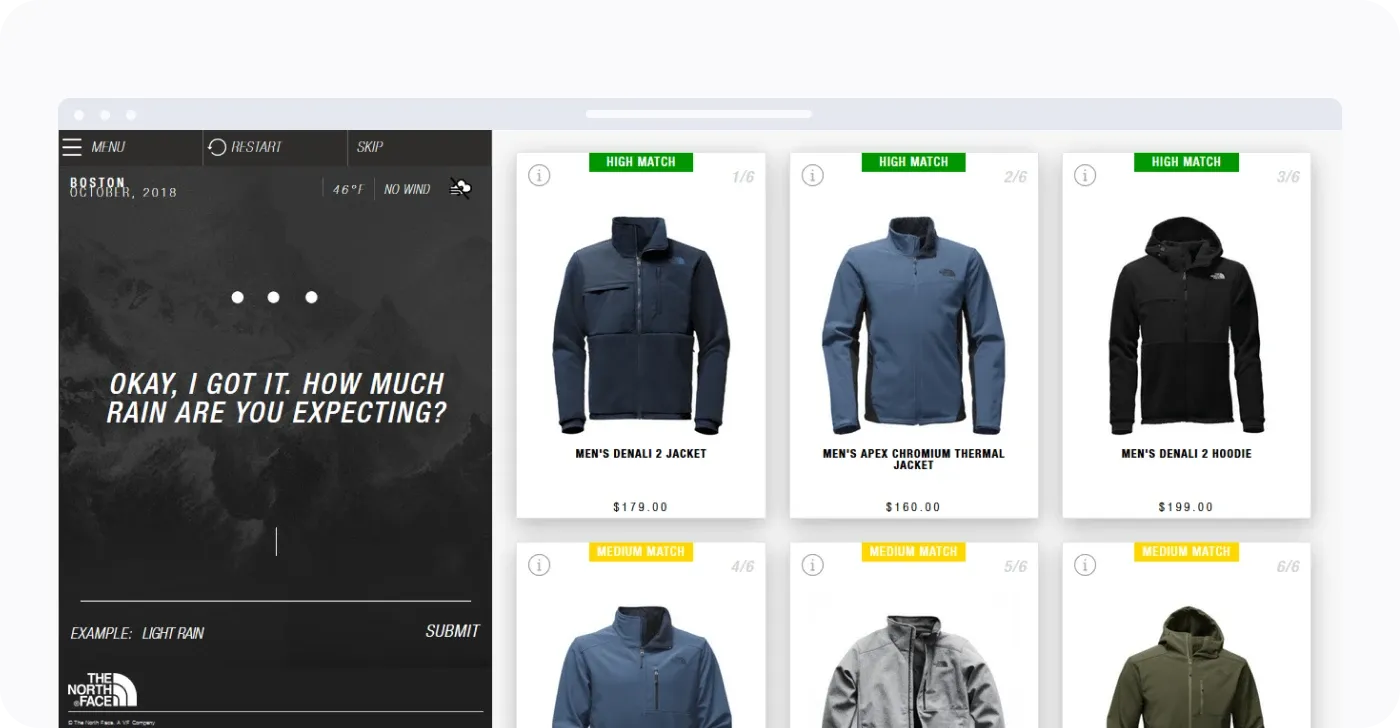
#2 AI for loyalty program personalization
Personalized rewards can significantly boost customer satisfaction and loyalty. By leveraging AI, you can reward customers with a non-generic special bonus that resonates with their values and preferences. For example, if they buy eco-friendly products, you can give them a special offer for sustainable products. AI also determines when the best time to reward a customer is, whether it's a birthday discount or a gift for an anniversary.
#3 Cross-sell and upsell suggestions
AI for marketing personalization is indispensable. For example, it’s helpful in suggesting complementary products and accessories. In this case, AI analyzes user shopping habits and preferences to recommend tailored product bundles. Such a feature increases the chances of boosting average order value (AOV) and overall revenue.
To see an example of such a recommendation system, you may visit Spotify. The company recommends music sets based on your previous likes and preferences, creates personalized playlists, and bundles them.

#4 AI chatbots for sales and support
Chatbots allow you to leverage AI personalization in sales and support. Automatic chatbots reduce your support team's load, providing your customers with quick answers before purchase and assisting them during the sales process and at the post-sale stage. Chatbots deliver answers three times faster and help automate an average of 30% of support team tasks. They can create lifelike conversations centered around customer requests, identifying the context, determining customer intention, and even asking new questions related to the dialogue.
Bank of America employs a virtual assistant called Erica to help customers manage their finances. Erica can answer questions related to cash flow, balances, transaction history, and even investments.
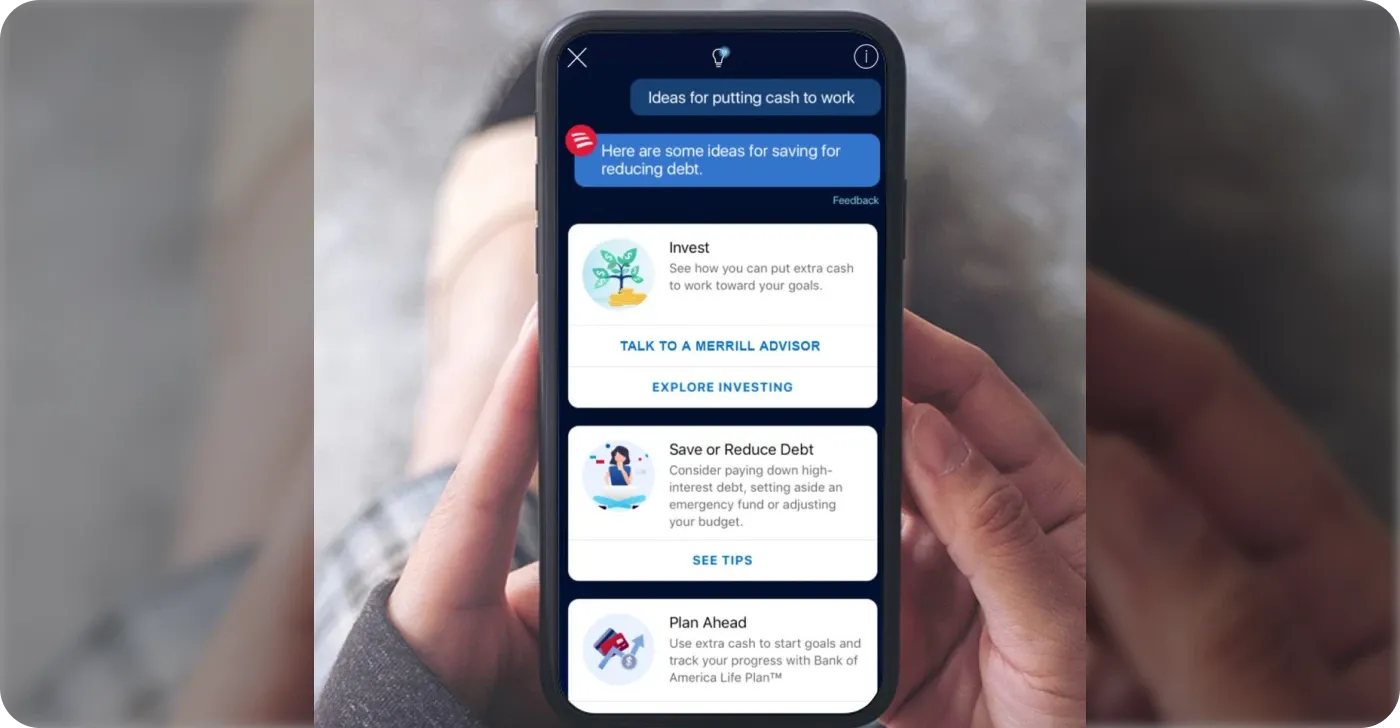
#5 AI-powered email campaigns
Personalized AI cold emails are not a novelty, yet companies leverage this tool for their sales endeavors, saving time for their teams. These NLP-based tools can write personalized intros, icebreakers, subject lines, and more by researching your contact base. AI email sequences are also applicable for nurturing leads that subscribed to your newsletter, streamlining AI personalization in marketing.
#6 Voice AI assistant
Nearly half of Americans use voice assistants on their smartphones. Hands-free and even screen-free searches are becoming increasingly popular, and using voice assistants for ecommerce could help keep up with the times and satisfy user demand for cutting-edge solutions. It’s especially important for the healthcare industry since voice chatbots can help people with disabilities handle their needs. However, it’s also applicable in the financial sector, travel industry, and shopping.
In 2019, Walmart announced Walmart Voice Order in collaboration with Google, which allowed customers to order products with voice commands, such as “Hey, Google. Add a shampoo to my shopping cart, please.” Later, the company partnered with Apple to make this option work for Siri.

#7 Personalized context-based search
Context-based searches implemented in your website or app can help customers find their best matches based on their browsing history and preferences. You can also include scanning external data, such as trending topics, the latest news, seasons, and more, to make search results even more accurate. In addition, contextual searches can suggest related products and auto-fill search phrases.
#8 Predictive analytics
Ecommerce enterprises use big data analytics and business intelligence tools to monitor sales, inventory, demand, marketing campaigns, and more in real-time. This massive amount of data is analyzed and visualized to make data-driven business decisions. Predictive analytics is a set of approaches that allow working with data, finding hidden patterns, and making predictions on micro and macro levels. You can analyze not only numbers but also customer feedback, reviews, and social media interactions to improve user experiences and marketing campaigns based on user behavior data.
#9 Personalized promotions
Promotions based on user preferences and shopping behavior help retailers boost sales and maintain customer satisfaction at the highest level. Promotion types could vary from seasonal discounts for a favorite product group to sales promotions available in a shop near you.
For example, Auchan proves that it’s possible to use AI for personalization in retail. They implemented a feature that uses geo-tracking to let customers know about available promotions when they’re nearby. Based on user behavioral data, they customize their mobile app's promotions.
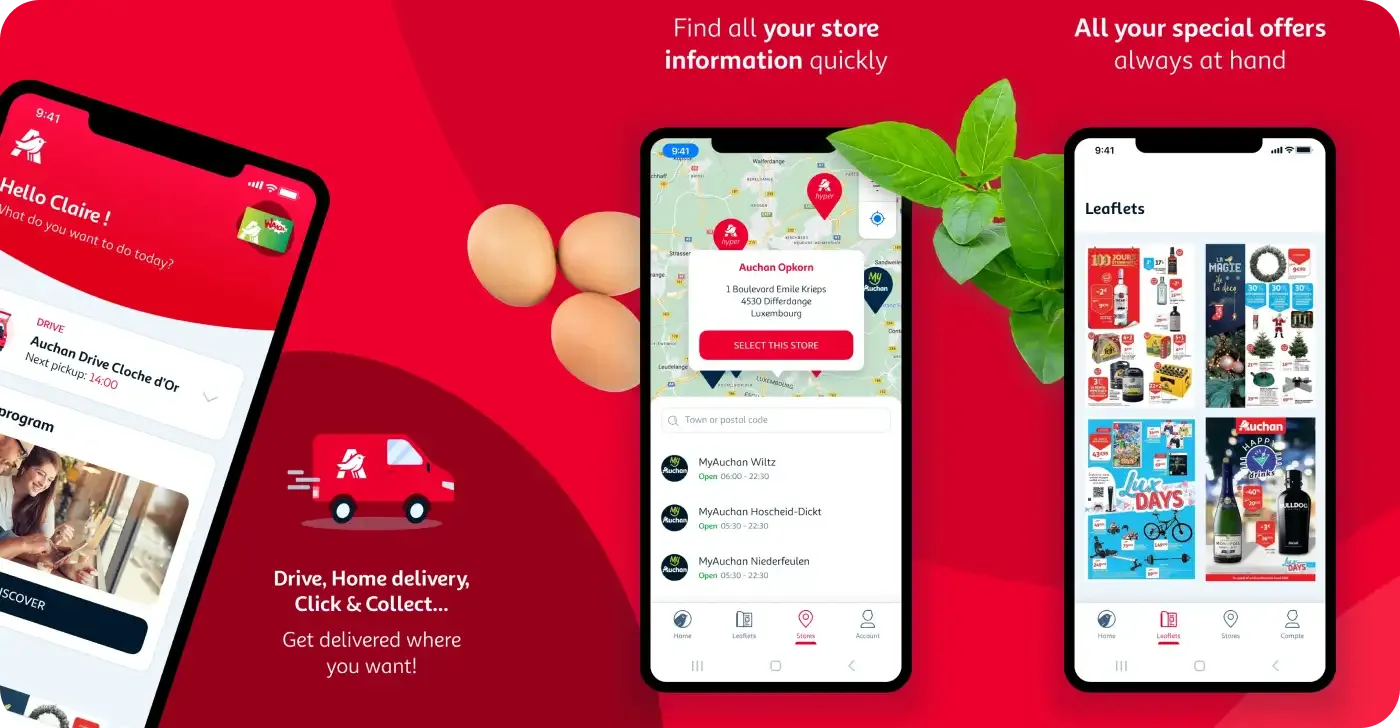
#10 Dynamic pricing and discounts
Adjusting prices to seasonal sales, market demand, and competitors' activity could be time-consuming and, if implemented inconsistently, even cause customer dissatisfaction. By incorporating machine learning into pricing strategy, you save tons of time and can implement changes in real-time, such as offering time-limited discounts based on user behavior. Such an AI model monitors a range of factors that can influence your pricing and adjusts it accordingly.
Amazon is the number one company when it comes to implementing dynamic pricing. They update prices for millions of products daily based on product demand, stock availability, customer behavior, and more, providing customers with the most competitive offers.
Tips to follow when leveraging AI in ecommerce personalization
Ensure compliance with data privacy regulations (e.g., GDPR, CCPA) when collecting and using customer data.
Be transparent about how AI personalizes experiences and give customers control over their data and preferences.
Continuously analyze the effectiveness of personalization strategies through A/B testing and analytics.
Refine AI models based on user feedback and evolving preferences to improve the accuracy and relevance of recommendations.
Conclusions
As you have seen, the role of generative AI services for ecommerce personalization is significant, and the areas of AI implementation continue expanding.
To sum up, let’s recall the top ten use cases for AI in ecommerce personalization.
- Personalized product recommendations help customers explore your product line based on their preferences.
- Loyalty program personalization boosts customer loyalty by delivering rewards that align with customer interest.
- Cross-sell and upsell suggestions increase average order value and total revenue.
- AI chatbots for sales and support save budget without compromising the level of customer service.
- AI-powered email campaigns help write cold emails and nurture leads through newsletters.
- Voice AI assistants answer customer queries without writing a word.
- Personalized context-based search helps customers find what they want faster.
- Predictive analytics delivers data-driven insights for making effective business decisions.
- Personalized promotions capture customer attention and boost sales through tailored offers.
- Dynamic pricing and discounts automatically change product costs depending on multiple factors.
We provide ecommerce website development services that integrate the latest AI technologies to ensure you receive a high-quality, cutting-edge solution tailored to your business needs. If you're interested in leveraging advanced personalization to enhance your ecommerce platform, get in touch with us today!

























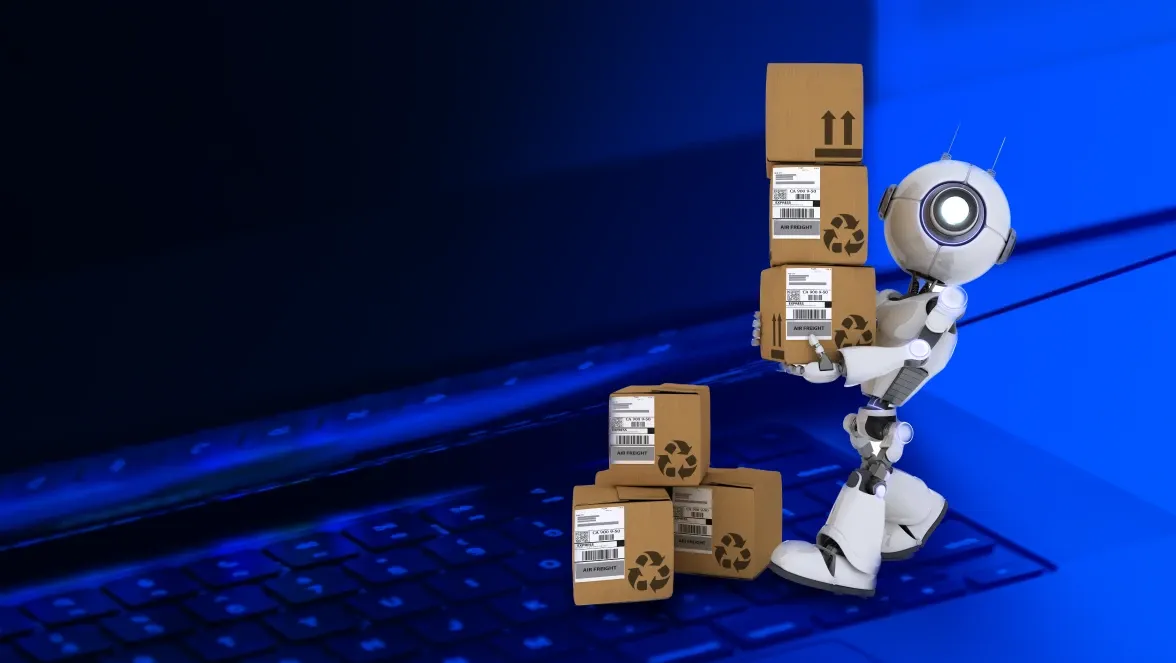







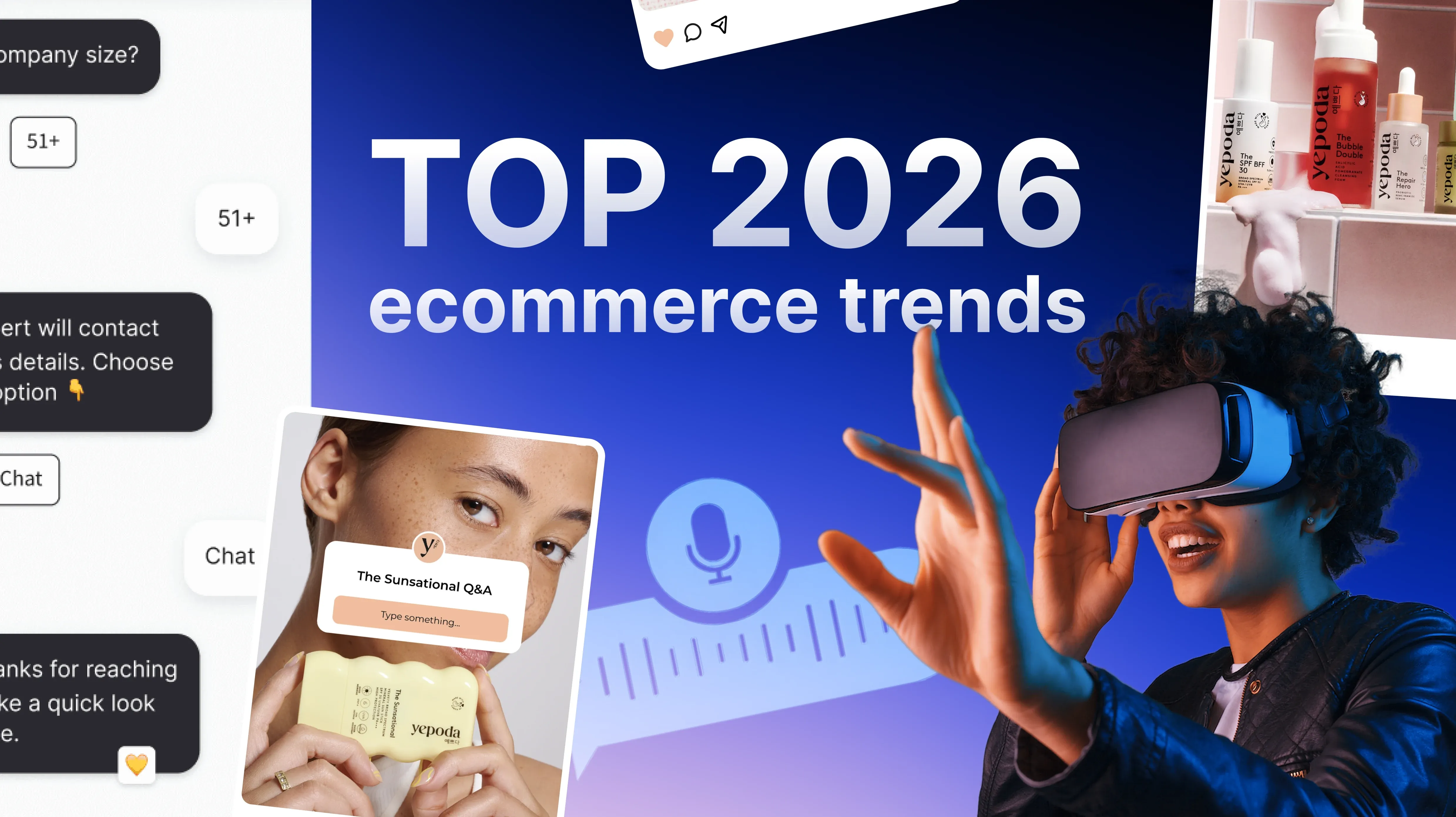
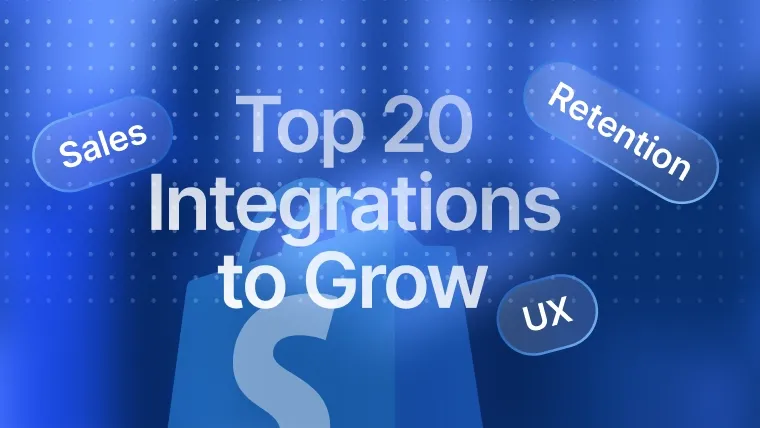




Was this helpful?
0
No comments yet